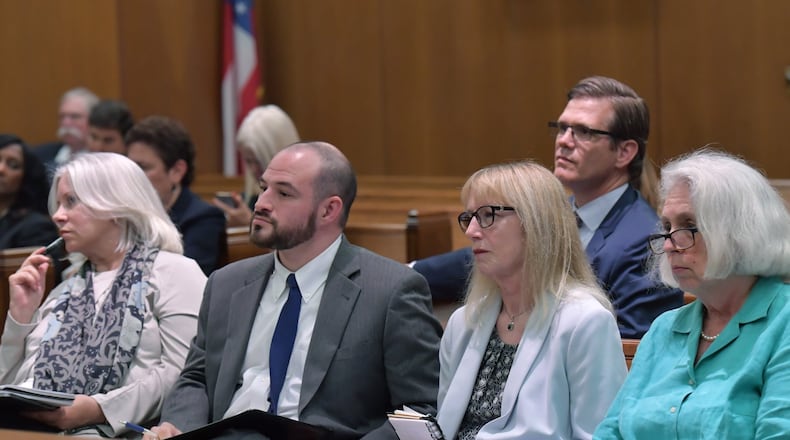The Georgia Supreme Court ruled Thursday that there wasn't enough evidence to further dispute last year's election for lieutenant governor, which had inexplicably low vote totals.
An election can't be overturned based solely on unusual vote counts in the lieutenant governor's race — tens of thousands fewer than in every other statewide election — the court wrote in its 94-page decision upholding a lower court's dismissal of the case. Specific evidence of illegal or improper votes is required, it said.
The plaintiffs in the case alleged there were about 127,000 fewer votes than expected compared with previous elections, a larger disparity than the 123,172-vote margin of victory for Republican Geoff Duncan over Democrat Sarah Riggs Amico.
“A party contesting an election must therefore offer evidence — not merely theories or conjecture — that places in doubt the result of an election,” according to the court’s 8-0 ruling, written by Justice Sarah Warren. “The petitioners in this case have not carried that burden.”
The lieutenant governor’s race, the second race on the ballot, had substantially lower vote totals than races for less prominent offices such as insurance commissioner, labor commissioner and Public Service Commission member. There were about 80,000 fewer votes for lieutenant governor than the average vote count in 10 statewide contests.
Each side offers competing explanations for the drop-off in votes.
Attorneys for Secretary of State Brad Raffensperger, whose office oversees elections, said voters may have decided to skip the lieutenant governor’s race because of the ballot design or because voters thought the candidates for lieutenant governor were running as a ticket with the candidates for governor.
But the plaintiffs said the state's 17-year-old electronic voting machines could have malfunctioned, or they could have been tampered with, altering vote totals.
“This is just a terrible blow to democracy,” said Marilyn Marks, the executive director for the Coalition for Good Governance, an election integrity organization that originally filed the lawsuit. “This ruling is basically saying that voters, campaigns and candidates have no oversight rights to their elections, which is counter to all democratic principles.”
Raffensperger called on activists to stop making “spurious claims” and fighting Georgia’s election system through the courts.
“This decision should put to rest for everyone except the most partisan activists that the 2018 election results in Georgia were true and accurate,” Raffensperger said. “I remain committed to implementing Georgia’s new, secure paper-ballot voting system in time for the 2020 presidential preference primary.”
The plaintiffs, who are a group of election integrity advocates, wanted to be able to inspect voting machines for problems that could have explained the low vote totals in the lieutenant governor’s race.
Amico, who is now running for the U.S. Senate against Republican U.S. Sen. David Perdue, said the irregularities in the lieutenant governor's race will motivate her to expand voting rights and enhance election security if elected.
“Widespread voter suppression, vulnerable voting machines and suspicious activity on the part of Republican officials will not quiet those of us who are determined to ensure that every eligible Georgian can cast their ballot in a secure, free and fair election,” said Amico, who was not a party in the case before the Georgia Supreme Court.
An attorney for Duncan, Ed Lindsey, said the electronic voting machines repeatedly passed tests for accuracy.
“There was no actual evidence of hacking or malware impacting the vote count, and the reasons for the difference in voter participation in the lieutenant governor’s race and other statewide races were numerous, non-nefarious and unrelated to the electronic voting system,” Lindsey said.
Georgia election officials are replacing the state's electronic voting computers with new touchscreens and printed-out paper ballots. The state's current voting system lacks a paper ballot, leaving no way to check digital election results for accuracy.
Critics of the new voting system say it won’t increase election integrity or guarantee correct results.
They allege in a federal lawsuit that Georgia’s new computer-printed ballots, scheduled to be used statewide in the March 24 presidential primary, will remain vulnerable to hacking, malware, bugs and misconfiguration. Voters won’t be able to detect whether scanning machines accurately record votes, and many voters won’t double-check their printed ballots.
The lawsuit is asking U.S. District Judge Amy Totenberg to order the state to switch to paper ballots filled out with a pen.
The story so far
What happened: The Georgia Supreme Court ruled against plaintiffs who argued there were tens of thousands of missing votes in last year's race for lieutenant governor.
What it means: Lt. Gov. Geoff Duncan's victory over Sarah Riggs Amico is confirmed, but there's still no clear explanation for low vote totals.
What's next: Plaintiffs in the case will continue fighting Georgia's voting systems in federal court, arguing that hand-marked paper ballots are needed for secure elections.
About the Author
Keep Reading
The Latest
Featured


